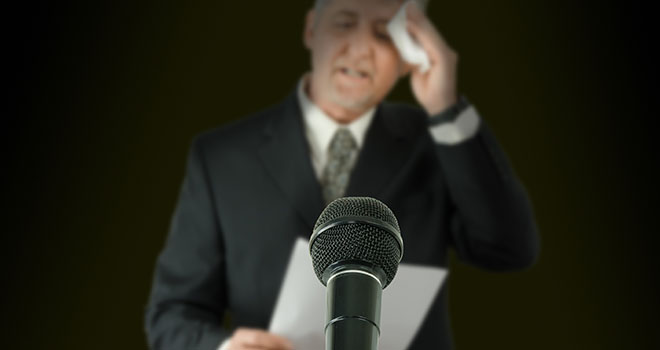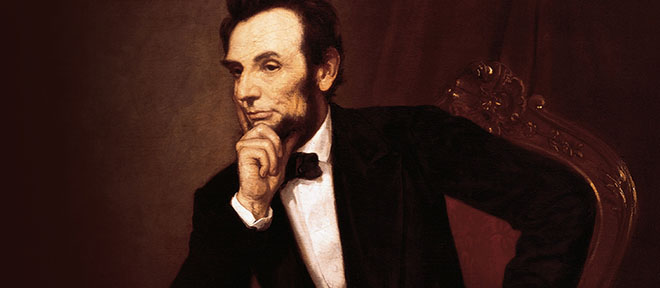What is Glossophobia and How to Overcome it
November 18, 2017 - Dom Barnard
Most people experience some degree of nervousness or anxiety when they give a speech, presentation, or perform on stage. They still manage to cope with the occasion even though they are not enjoying it. However, people who suffer from glossophobia may deliberately avoid situations where they would have to speak in public.
In this article, we cover what exactly glossophobia is, what causes it, what the symptoms are, how to treat it and exercises to help further overcome it.
Speaking Up without Freaking Out webinar, with Matt Abrahams, Lecturer in Organizational Behavior at Stanford University's Graduate School of Business.
What is glossophobia?
The term glossophobia derives from the Greek word γλῶσσα glōssa, meaning tongue, and φόβος phobos, fear or dread. Most of us have experienced some sort of fear when speaking in public at some time in our lives.
However, a person with glossophobia is unable to control their nerves and has an extremely strong fear of public speaking, sometimes to the point of a nervous breakdown. With this can come uncontrollable trembling, sweating, and a racing heartbeat.
This speaking anxiety may not be confined to speaking to large audiences – people suffering with glossophobia may struggle to speak in a meeting, classroom and in other smaller group settings.
This can make it very difficult for sufferers to communicate verbally in order to express their ideas and thoughts. As a result, glossophobia may hamper the sufferer’s ability to further his or her academic, social or career opportunities.

Glossophobia is a social phobia or social anxiety disorder, with recognisable symptoms and treatment. If left untreated, this can lead to loneliness, poor self-esteem, depression and isolation. There are helpful strategies to manage and cope effectively with glossophobia.
Symptoms and signs
Glossophobia causes a feeling of intense anxiety, including certain physical and verbal symptoms and signs. Even the thought of group activities and presentations can trigger these symptoms - worrying what people will think of us, worrying that we will stumble over our words, worrying that we will forget what to say.
People suffering with glossophobia may avoid events that centre on group activities – they might call in sick or make excuses to avoid the event.
When faced with having to give a presentation, many people experience the fight-or-flight response. This is the body’s way of preparing to defend itself against perceived threats through an increase in adrenaline. Particularly when speaking on stage, when you are exposed to people all around you, the fear is heightened and you’ll find yourself crossing arms and legs as a natural defence mechanism.
Personal Report of Public Speaking Anxiety (PRPSA)
Here is a highly reliable survey to measure your public speaking anxiety. The survey was created by Dr. James C. McCroskey.
Start SurveyPhysical symptoms
Psychological symptoms of glossophobia can lead to acute hearing loss or other physical symptoms. When the mind is cluttered with thoughts, extreme tension is developed which affects a person's hearing.
Heart palpitations or increased heart rates can develop as a result of the intense anxiety or stress. This can lead to increased blood pressure and the physical response causes the pupils to dilate and can cause the one to sweat.
Here are some of the common physical symptoms:
- Increased heart rate
- Raise in blood pressure
- Dilation of pupils
- Acute hearing loss
- Intense dread and trembling
- Sweating, particularly on the hands and forehead
- Nausea or vomiting in extreme cases
- Shortness of breath or hyperventilating
- Dizziness
- Muscle tension in the neck and upper back muscles
- Feeling of nervousness or panic attack
- Frequently needing the bathroom
Verbal symptoms
Some of the verbal symptoms that develop from glossophobia can cause the person to strain while trying to speak. The voice may quiver and shake, the person may repeat hesitations such as 'umm' or 'ah', followed by vocal pausing. This reaction causes the person to feel uncomfortable and anxious, worsening the symptoms of glossophobia.
Speech anxiety can lead to dysfunctional speech and stammers or tics, since the intense anxiety may prevent one from speaking properly. Speech disorders can develop as well, which are caused by stress-induced reactions during public speaking.
Here are some of the common verbal symptoms:
- Dryness in the mouth
- Weakened tone of voice and feeling energy less
- Trembling voice due to tension
- Shaking or quivering voice
- Hesitation words such as ‘umm’ and ‘ah’
- Stammers or tics
- Vocalised pauses
Grow your confidence with interactive practice exercises, on skills such as public speaking, impromptu speaking, giving feedback, and more.
How many people suffer from glossophobia?
According to one estimate, 75% of people experience some degree of anxiety or nervousness when public speaking, and 10% of people are terrified. Speaking in public is one of the most common fears, ranking among heights, death and snakes.
A survey by YouGov in the U.K. asked more than 2,000 people to rate 13 common phobias, with glossophobia coming 3rd, only beaten by the fear of snakes and heights.

Consequences of suffering from glossophobia
If you want to be successful in your career, chances are you’ll need to be able to communicate your ideas effectively and lead teams. From job interviews to team meetings to running your own business, many activities in life require speaking in public to groups of people. Not being able to do this could cause you to lose out on many opportunities because speech anxiety takes control of your life.
However, all is not lost if you want to avoid verbal communication in your career. There are jobs which require very little of it, with most communication being accomplished through email, Slack or other online, non-verbal forms. Having worked with many developers and engineers, some of these roles require almost no verbal communication, as long as you deliver projects on time.
What causes glossophobia?
There are several possible root causes and triggers to worsen glossophobia in people.
Natural human response to being exposed
This fight-or-flight response has its roots with our ancestors, when humans had to fear being attacked by wild animals and other tribes. It causes you to tense up with anxiety when exposed to people, for example on a stage in front of an audience. Getting use to this exposure and controlling your body language to be open to it will help.
Negative experiences early in life
Some people believe that glossophobia forms early on in life and stems from negative viewpoints of oneself, such as "nobody cares about what I have to say". This might be caused by a series of negative experiences, for example where students, teachers of parents do not value what you say, or even if you talked in a group situation and were ridiculed for what you said.
Testing conducted by the National Institute of Mental Health found that the brains of people with social anxiety have a heightened response when negative comments were read to them. The affected areas were those responsible for self-evaluation and emotional processing. This heightened response wasn’t seen in people without the disorder.
Runs in families
Though social phobias often run in families, the science behind this isn’t understood. The biology of fear - and anxiety-related behaviors study that breeding mice that show less fear and anxiety resulted in offspring with less anxiety. But more research is needed to assess whether social phobias are hereditary.
Self-defeating thoughts
In some instances, glossophobia links to social anxiety and phobia disorders. Some people believe a person's self-defeating thoughts lead the person to believe that they will fail while speaking in public. The person may feel that they must measure up to perfection, otherwise they are useless.
Many people who have a strong fear of public speaking fear being judged, embarrassed, or rejected.
Presentation on dealing with glossophobia
Example situations where glossophobia might arise
According to Barbara Fish, the fear may happen in the classroom where the student hopes that the teacher doesn’t call on him to answer a question. It can happen in the workplace where the manager experiences panic attacks at the thought of making a presentation to her superiors.
It can happen at home where the jobseeker becomes emotionally distraught before going on a job interview. It can happen at a party where the possibility of meeting someone new is curtailed by butterflies in the stomach and sweaty palms. The thought of speaking in public can leave us frozen with fear.
Here are some examples where glossophobia might arise:
- Musicians, actresses and actors performing in front of huge crowds
- Business people making presentations to their team
- Calling a friend or colleague about something
- Children dreading being asked a question by their teacher
- Giving a speech at a wedding, for example a best man speech
- Anticipating going to a conference where lots of unknown people will be
- Cabin crew and pilots making announcements to their passengers
How is glossophobia treated?
There are different steps you can take to treat your glossophobia. Here we discuss psychotherapy, medication, exposure therapy and herbal remedies – depending on the severity of your fear, different ones may apply. We then discuss practical steps you can take when giving a presentation or speech to help overcome your fear.
Psychotherapy
Many people are able to overcome their glossophobia with cognitive behavioural therapy (CBT). Working with a therapist can help you identify the root cause of your anxiety. For example, you may discover that you fear ridicule, rather than speaking, because you were mocked as a child.
Together, you and your therapist will explore your fears and the negative thoughts that go with them. Your therapist can teach you ways to reshape any negative thoughts.
Examples of this might include:
- Instead of thinking “I can’t make any mistakes,” accept that all people make mistakes or have omissions when presenting. It’s okay. Most of the time the audience isn’t aware of them.
- Instead of “Everyone will think I’m incompetent,” focus on the fact that the audience wants you to succeed. Then remind yourself that your prepared material is great and that you know it well.
Once you’ve identified your fears, practice presenting to small, supportive groups. As your confidence grows, built up to larger audiences.

Medications
If therapy doesn’t relieve your symptoms, your doctor may prescribe one of several medications used to treat anxiety disorders.
Beta-blockers are usually used to treat high blood pressure and some heart disorders. They also can be helpful in controlling the physical symptoms of glossophobia, such as shaking or trembling.
Antidepressants are used to treat depression, but they also can be effective in controlling social anxiety.
If your anxiety is severe and affecting your daily life, your doctor may prescribe benzodiazepines like Ativan or Xanax.
Brain chemicals such as Serotonin help to regulate the mood level of a person. During phobic episodes, the mood level goes down. Anti-anxiety and anti-depressant medicines can help to adjust these type of brain chemicals.
Exposure therapy
Exposure therapies are seen as most effective treatment method for the fear of public speaking. The therapist guides you through regular exposure sessions where the person will need to face public speaking settings.
The therapist also teaches various relaxation methods such as muscle releasing exercise, mind visualization exercises and meditation to use during such exposure sessions. The person eventually builds up a tolerance for the fear and anxiety.
Herbal remedies
For people with milder symptoms, there are a range of herbal and homeopathic remedies that can help in calming the anxiety experienced before events that involve public speaking.
Aconitum napellus or Gelsemium, etc may be recommended by homeopaths based on the exact history, symptoms as well as the individual’s nature and temperament. Herbal remedies like Lemon balm, lavender and Passion Flower etc can also help soothe the nerves and calm one before a public speaking event.
Practical tips for overcoming glossophobia
Here are some useful tips you can use, either in combination with the above treatment or on their own. These focus on public speaking or presentation events, and ways you can reduce your fear:
- Know your material - you will be much more comfortable talking about something about which you are knowledgeable. Give special focus to the introduction, because this is when you are likely to be most nervous.
- Practice often and aloud - you should continue practicing until you’re comfortable with what you’re going to say. Your confidence will increase as you realize that you know what you’re going to say.
- Videotape your presentation - you can note if changes are needed. And you may be pleasantly surprised at how authoritative you look and sound.
- Use virtual reality – practice in realistic virtual environments before the event to overcome anxiety.
- Prepare possible audience questions - come up with a list of potential questions your audience might ask you, then prepare answers and even additional presentation slides to answer them.
- Don't memorize your speech - if you commit your entire speech to memory and then forget even just one line of it, things could spiral out of control and you may find yourself unable to remember the rest of it. You are much better off knowing the essence of what you want to say.
- Understand your audience - will you be addressing a group of experts or one that knows little about the topic? Being aware of your audience will help you structure your presentation accordingly as well as prepare for it. You should always be more knowledgeable than your audience.
- Speak slowly - people tend to talk more quickly when they are nervous so make a conscious effort to slow down. You will be less likely to stumble over your words if you aren't rushing through your speech.
- Keep a glass of water next to you - having a dry mouth while giving a speech happens to everyone not only those who are fearful of public speaking. To keep from feeling like your mouth is filled with cotton, take sips of water occasionally.
- Don’t say how nervous you are – try not to complain to others about how anxious you feel. Dwelling on it will just serve to exacerbate your anxiety. Instead pretend to be confident even if you feel anything but.
- Familiarise yourself with the room – arrive early and stand on the stage if possible, visualise the audience and where you will stand on the stage. Check all equipment works, such as a laptop or projector.
The power of practice
The more you practice, the more comfortable you’ll be in front of crowds. You might find it beneficial to take a public speaking class or workshop, such as Toastmasters International, an organization that trains people in public speaking, or use virtual reality as a form of exposure therapy.
Learn more about practice in virtual reality (VR).
Hidden audience and groups
Interestingly, some glossophobics are able to perform effectively on stage, dance, sing and even converse in a stage play till they do not see the audience. Some people feel comfortable on stage if they are under the notion that they are signifying a character or stage persona relatively than presenting themselves. The anxiety caused by glossophobia can be alleviated by amalgamating the people in a group like a band or choir.
Many famous people have had a fear of public speaking
Many famous people have suffered from glossophobia, including actors, politicians and even presidents. Some notable examples are Renée Zellweger, Nicole Kidman, Abraham Lincoln, Gandhi, Sigmund Freud and Thomas Jefferson. At some point, they all mention actually going out of their way to avoid speaking in public.
Another example is Gandhi who, according to an article in The Atlantic titled Performance Anxiety in Great Performers, was due to be speaking in a court and only managed to say the first sentence of his speech before he dried up and an assistant stepped in and finished the speech for him.

Many famous people have suffered from a fear of public speaking, including Abraham Lincoln.
Exercises to help you relax and control your breathing
Relaxation and breathing techniques are useful when trying to calm your nerves before speaking in public. When we are nervous, we tend to talk quickly and only take short, shallow breaths, causing our lungs to only partially fill. This reduces our vocal range and makes us sound nervous. Therefore slowing down our breathing and learning to relax are very important.
Here are some exercises from the British Council on overcoming your fear of public speaking.
Exercise 1 – Learning to relax
Find a comfortable place and lie on the floor. Close your eyes and concentrate on relaxing every part of your body, starting with your feet and legs and working upwards to your shoulders, neck and head. Now bring your attention to your breathing. To begin with, just be aware of breathing in and out.
Now try to imagine a place that you can associate with calmness. Picture this place and hear the sounds, smell the smells.
Once you have become familiar with recalling this special place, it can be somewhere to go whenever you are feeling nervous – such as just before you go on stage to make a speech.
Learning to relax takes time but it will really help, especially if you do this exercise regularly. After a while, you'll be able to recall the feelings of relaxation anywhere.
Exercise 2 – Cantering yourself
Stand with your feet shoulder-width apart, your hands hanging loose, shoulders down and head relaxed on your neck.
First, try to collect your thoughts and think in your head. Feel yourself become lighter.
Now try to think in your stomach, and start to feel yourself getting rooted in the ground. You are effectively 'thinking your centre of gravity' down through your body. This process is called 'cantering' and it may take a little practice.
Now breathe in, and feel the breath going right down into your centre, i.e., to the bottom of your lungs and into your stomach. Breathe out allowing your diaphragm to control the outward breath.
Exercise 3 – Get to know your space
Nerves often come from the unknown, so go to the room or hall where you will be speaking, and walk around it, rehearsing your speech out loud. Now sing parts of your speech and move around allowing your voice to fill the space.
Exercise 4 – Breathing a few minutes before your speech
Just before you start your speech, breathe in, counting up to seven, and breathe out when you reach 11. Do this three or four times. It helps slow the build-up of adrenaline and reduces your heart rate, thereby diminishing feelings of nervousness or anxiety.


